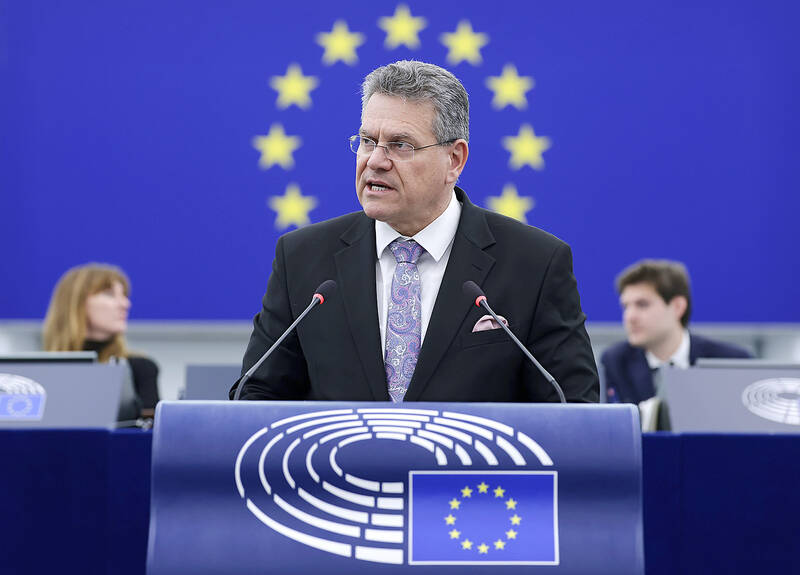The EU has resumed its case against China at the WTO over allegations of economic coercion targeting Lithuania, an EU official said.
Bloomberg reported on Wednesday that the EU was expected to resume the case this week following a one-year suspension. It might re-suspend the proceedings again as early as next week to gather more evidence.
The EU filed a complaint against China at the WTO in 2022 as a result of trade restrictions Beijing imposed on Lithuania after the Baltic country opened a Taiwanese representative office in its capital.

Photo: EPA-EFE
China has repeatedly voiced opposition to countries engaging in official contact with the government in Taipei.
The commission, the EU’s executive arm, at the time, said that China was using economic coercion against one of its member states — a claim that the US and 17 other countries supported as third parties in the case.
In January last year, the EU decided to suspend the proceedings, setting off a year-long lobbying frenzy, with other capitals pushing Brussels not to give up for fear that it would set a bad precedent. The deadline to resume the case expires this week.
Officials from then-US president Joe Biden’s administration had urged the EU to keep pursuing the case.
Not doing so would also have risked antagonizing US President Donald Trump’s administration and some EU members.
The EU is trying to strike a balance between its initial exchanges with Trump and his advisers, who have been vocal about the bloc taking a stronger stance toward China.
The logic back then was that the EU would have likely lost the case because the required evidence was no longer there and could make the EU look weak, people familiar with the matter said.
Suspending the case was tactical, one of the people said, who like the others was granted anonymity to discuss sensitive issues.
The EU has numerous other cases at the WTO involving China, including over patent royalties.
It has also probed the second-largest economy in several areas including public tenders, the procurement of medical devices and electric vehicles, where the bloc applied tariffs last year despite immense pressure from Beijing.

AI SERVER DEMAND: ‘Overall industry demand continues to outpace supply and we are expanding capacity to meet it,’ the company’s chief executive officer said Hon Hai Precision Industry Co (鴻海精密) yesterday reported that net profit last quarter rose 27 percent from the same quarter last year on the back of demand for cloud services and high-performance computing products. Net profit surged to NT$44.36 billion (US$1.48 billion) from NT$35.04 billion a year earlier. On a quarterly basis, net profit grew 5 percent from NT$42.1 billion. Earnings per share expanded to NT$3.19 from NT$2.53 a year earlier and NT$3.03 in the first quarter. However, a sharp appreciation of the New Taiwan dollar since early May has weighed on the company’s performance, Hon Hai chief financial officer David Huang (黃德才)

The Taiwan Automation Intelligence and Robot Show, which is to be held from Wednesday to Saturday at the Taipei Nangang Exhibition Center, would showcase the latest in artificial intelligence (AI)-driven robotics and automation technologies, the organizer said yesterday. The event would highlight applications in smart manufacturing, as well as information and communications technology, the Taiwan Automation Intelligence and Robotics Association said. More than 1,000 companies are to display innovations in semiconductors, electromechanics, industrial automation and intelligent manufacturing, it said in a news release. Visitors can explore automated guided vehicles, 3D machine vision systems and AI-powered applications at the show, along

FORECAST: The greater computing power needed for emerging AI applications has driven higher demand for advanced semiconductors worldwide, TSMC said The government-supported Industrial Technology Research Institute (ITRI) has raised its forecast for this year’s growth in the output value of Taiwan’s semiconductor industry to above 22 percent on strong global demand for artificial intelligence (AI) applications. In its latest IEK Current Quarterly Model report, the institute said the local semiconductor industry would have output of NT$6.5 trillion (US$216.6 billion) this year, up 22.2 percent from a year earlier, an upward revision from a 19.1 percent increase estimate made in May. The strong showing of the local semiconductor industry largely reflected the stronger-than-expected performance of the integrated circuit (IC) manufacturing segment,

COLLABORATION: Softbank would supply manufacturing gear to the factory, and a joint venture would make AI data center equipment, Young Liu said Hon Hai Precision Industry Co (鴻海精密) would operate a US factory owned by Softbank Group Corp, setting up what is in the running to be the first manufacturing site in the Japanese company’s US$500 billion Stargate venture with OpenAI and Oracle Corp. Softbank is acquiring Hon Hai’s electric-vehicle plant in Ohio, but the Taiwanese company would continue to run the complex after turning it into an artificial intelligence (AI) server production plant, Hon Hai chairman Young Liu (劉揚偉) said yesterday. Softbank would supply manufacturing gear to the factory, and a joint venture between the two companies would make AI data